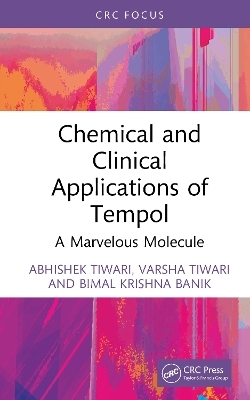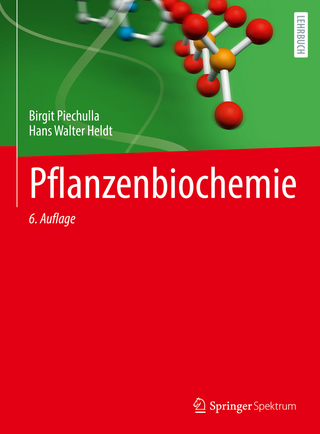
Chemical and Clinical Applications of Tempol
CRC Press (Verlag)
978-1-032-73002-8 (ISBN)
Dr. Abhishek Tiwari Dr. Tiwari obtained his B. Pharm. degree from Jiwaji University Gwalior (M.P.), M. Pharm. From M. S. Ramaiah College of Pharmacy, Bengaluru (Karnataka) and Ph.D. from Uttarakhand Technical University, Dehradun (Uttarakhand). Dr. Tiwari has received grants of more than Rs. 8.5 million from the Department of Biotechnology, Uttarakhand; All India Council of Technical Education, India, CCRUM, India and Power Finance Corporation. Dr. Tiwari has been granted 22 granted patents and 09 designs. In addition, he has submitted a number of patents for approval. Dr. Tiwari is an editorial member of various national and international journals. He received "Outstanding Academic and Research Award" in 2021, Best Author Award" in 2019, “Best Teacher Award” in 2019 and “Outstanding Teacher Award” in 2014 and 2015. He has published 78 papers in international journals. Remarkably, he has published more than 22 books and 36 Book chapters in Wiley, Elsevier, Tailor & Francis, Apple Academic Press and Nirali Prakashan, Pune. He is a recognized Ph.D. supervisor of Uttarakhand Technical University, Dehradun, and IFTM University, Moradabad. Dr. Varsha Tiwari Dr. Tiwari obtained her B. Pharm. degree from Jiwaji University Gwalior (M.P.), M.Pharm. from M.S. Ramaiah College of Pharmacy, Bengaluru (Karnataka) and Ph.D. from Uttarakhand Technical University, Dehradun (Uttarakhand). Dr. Tiwari has been granted 20 patents and 09 designs. In addition, she has submitted a number of patents for approval. She has received “Young scientist Award" in 2022, "Young Teacher Award" in 2020, “Pharma Recognition Award” in 2019 and “Outstanding Teacher Award” in 2015. She has published 68 research papers in national and international journals. Remarkably, she has published more than 12 books and 20 chapters. She is a recognized Ph.D. supervisor of IFTM University, Moradabad. Her core area includes Diabetes, Nanotechnology and Phytochemistry and chromatography-based analysis. Prof. Bimal Krishna Banik conducted his doctoral research at the Indian Association for the Cultivation of Science, Calcutta. Then, he pursued postdoctoral research at Case Western Reserve University and Stevens Institute of Technology. Dr. Banik was a Tenured Full Professor of Chemistry and First President’s Endowed Professor of Science & Engineering at the University of Texas-Pan American. He was also the Vice President of Research & Education Development of the Community Health Systems of Texas. At present, Dr. Banik is a Full Professor of the Deanship of Research Development at the Prince Mohammad Bin Fahd University (Kingdom of Saudi Arabia). Professor Banik taught chemistry to B. S., M. S., and Ph. D. students in USA and Saudi Arabia universities for many years. In research, he directly mentored approximately 300 students, 20 postdoctoral fellows, 7 Ph. D. research scientists and 28 university/college faculties. He acted as the advisor of two students’ organizations that had 1400 students. As the Principal Investigator (PI), he was awarded $7.25 million in grants from NIH and NCI. Importantly, he has about 680 publications along with more than 500 presentation abstracts. Many of his international presentations were designated as Keynote and Plenary lectures. He has edited/authored 23 books (Springer Nature, Springer, Elsevier, De Gruyter, Nova, and Taylor & Francis). The number of citations of his publications is 9469. Professor Banik served as the PI of a joint green chemistry symposium between USA and India. He chaired 20 symposiums at the American Chemical Society (ACS) National Meetings and over 2 dozens at the International level, including 1 at the Nobel Prize Celebration. In the capacity of chair, he introduced about 300 speakers. He is a Reviewer of 93, Editorial Board Member of 26, Editor-in-Chief of 12, Founder of 8, and Guest Editor of 10 research journals. As the Editor-in-Chief, he recruited approximately 200 Associate Editors and Editorial Board Members. He is an examiner of NSF, NCI, NIH, NRC, DOE, ACS and International grant applications; Panel Member of NSF and NCI/NIH grant sections. He served as the Chair/Member of more than hundred scientific committees. Professor Banik was given the Indian Chemical Society’s Life-Time Achievement Award; Mahatma Gandhi Pravasi Honor Medal from the UK Parliament; US National Society of Collegiate Scholars’ Best Advisor Award for students; Professor P. K. Bose Medal; Dr. M. N. Ghosh Gold Medal; University of Texas Board of Regents’ Outstanding Teaching Award; and ACS Member Service Award.
Chapter 1: A Brief Account on Tempol
Chapter 2: Synthesis and chemical reactions of tempol
Chapter 3: Tempol in the synthesis of terpenoids
Chapter 4: Name reactions involved in Tempol
Chapter 5: Industrial applications of Tempol
Chapter 6: The role of Tempol in NRTI-induced mitochondrial toxicity.
Chapter 7: The significance of Tempol in diabetic nephropathy
Chapter 8: Mechanistic Insights into the reaction between a nitroxide Radical (Tempol) and a phenolic antioxidant
Chapter 9: Tempol – an ocular neuroprotectant
Chapter 10: Miracle drug Tempol in cancer treatment
Chapter 11: Tempol as reactive oxygen inhibitor
Chapter 12: Nano-formulations of Tempol
Chapter 13: Safe Handling, Storage, and Disposal of 4-Hydroxy-TEMPO in Compliance with Pharmaceutical Regulations
| Erscheinungsdatum | 15.11.2024 |
|---|---|
| Zusatzinfo | 3 Tables, black and white; 45 Line drawings, black and white; 45 Illustrations, black and white |
| Verlagsort | London |
| Sprache | englisch |
| Maße | 138 x 216 mm |
| Themenwelt | Naturwissenschaften ► Biologie ► Biochemie |
| Naturwissenschaften ► Chemie ► Organische Chemie | |
| Technik | |
| ISBN-10 | 1-032-73002-1 / 1032730021 |
| ISBN-13 | 978-1-032-73002-8 / 9781032730028 |
| Zustand | Neuware |
| Haben Sie eine Frage zum Produkt? |
aus dem Bereich


